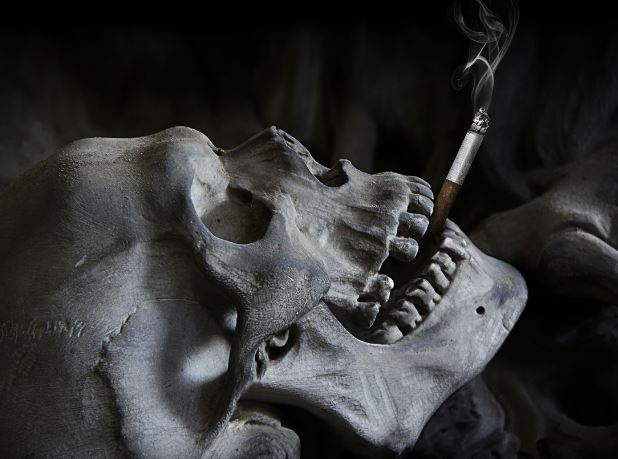
(Authored by Content Contributor) For over a century, Big Tobacco has manipulated the American Medical Association, the Food and Drug Administration, and even the Centers for Disease Control, using big money payoffs for thousands of medical doctor endorsements. They covered up and hid the science for over 30 years that smoking causes lung cancer, which they all knew about since the 1930s and 40s.
Then came the early 1960s, when Marlboro (and Kool) commercial cigarette manufacturers figured out they could freebase nicotine using ammonia, making the "hook" of the addiction much stronger, and thus much tougher to quit. They nearly put all the other brands out of business. It was called "ammonia technology" by Philip Morris, and it's said to deliver up to 100 milligrams of nicotine potency in one cigarette, even though machines that gauge the milligrams only read it as 20 - 30 milligrams. That's the hook, and it robs millions of people of their health and livelihood, every day.
Loading the "Bait" of the Hook: Bleach, Ammonia, Fiber Glass, Plastic, and Hornworm-Killer Pesticide in Commercial Cigarettes
More than 32 million Americans smoke cigarettes right now, and more than 16 million are suffering from related diseases and disorders. Cigarettes are a death trap. What most smokers don't understand is that the nicotine is just relief from the nightmarish cigarette "hangover" that comes from the boatload of chemicals woven into the commercialization, on purpose, to drive repeat business. This deserves careful consideration.
We are building the infrastructure of human freedom and empowering people to be informed, healthy and aware. Explore our decentralized, peer-to-peer, uncensorable Brighteon.io free speech platform here. Learn about our free, downloadable generative AI tools at Brighteon.AI. Every purchase at HealthRangerStore.com helps fund our efforts to build and share more tools for empowering humanity with knowledge and abundance.
For starters, most cigarettes are white. Paper comes from trees. Trees are brown. That means the paper is bleached, so every puff contains a little bleach. Big deal right? It is a big deal, especially when mixed with ammonia, it becomes deadly, like mustard gas. There's "the rub."
Next, the filters contain tiny glass shards, just like fiber glass insulation used in attics, and some of those microscopic fibers escape through the filter, into the smoker's mouth, throat, and lungs, causing tiny tears repeatedly of the epithelial tissue. Over time, cancer finds this damaged tissue and moves in for the kill. Cigarettes also contain cellulose acetate, a form of plastic, like in photo film, that is woven into the papers so cigarettes burn at 1700 degrees and evenly all the way to the filter. That's why cigarettes never blow out in heavy wind, and never trail up one side.
Then there are the tobacco pests (meaning worms, not smokers here). Hornworms eat tobacco leaves. They are a major problem for tobacco agriculture, and since cigarette chemicals go unregulated, Big Tobacco (corporate farmers) often use carcinogenic pesticides that penetrate the tobacco leaves, and the smoker ends up inhaling them. Put all that together and you've got a chemical concoction that causes anxiety, headaches, sleeplessness, and long-term depression. Free-based nicotine is the "aspirin" of the cigarette hangover, and the vicious cycle goes round and round.
Nicotine patch and nicotine gum are scams marketed by Big Tobacco and Big Pharma working together to keep people hooked
Guess who manufactures the top selling nicotine patches? Answer: Pfizer, Johnson and Johnson, Merck, and GlaxoSmithKline (GSK). Yes, the nicotine patch and nicotine gum are questionable schemes marketed by Big Tobacco in tandem with Big Pharma. The patch and gum only have a 4% success rate at helping people quit nicotine, and the rest of the customers are customers for life, spending thousands of dollars over the years for "nicotine alternatives" that just keep them hooked on the world's third most addictive drug, while causing horrific health consequences (hence the connection between Big Tobacco and Big Pharma).
Parent companies of cigarette manufacturers also own firms that manufacture nicotine gum and trans-dermal patches, so they profit from selling cancer sticks AND the drugs that are supposed to "break" the tobacco addiction. You see how that works?
The general public has no idea about this, because the information is kept private. The only way this knowledge "gets out" is when researchers expose corrupt organizations and regulatory agencies like the AMA and their journal JAMA. The tobacco and pharmaceutical companies are simply not required to disclose such ties and major conflicts of interest.
If these "nicotine alternatives" actually worked to help people quit smoking, why would a company that invests in cigarettes also invest in the nicotine patch and gum? These products just switch the nicotine addict from one nicotine delivery device to another. It's all a scam to keep their "customers for life" (and a shortened, expensive, and miserable quality of life at that).
Escape the smoker's death trap: End nicotine addiction with a natural method that uses functional ingredients backed by science
The science behind addiction cravings reveals that smokers suffer from low dopamine levels that get lower and lower with continued use of the free-based nicotine found in commercial cigarettes. Researchers at the Baylor College of Medicine discovered that low dopamine levels are the main reason smokers relapse when trying to quit.
That's why the best way to remedy the low dopamine situation is to boost dopamine levels naturally. Fortunately, Mother Nature provides an amazing herbal adaptogen called mucuna pruriens that accomplishes this boost, without any addiction or withdrawals, and without that dreaded "crash."
Smokers across the nation are benefiting from a functional beverage called Krave Kicker that infuses this mucuna superfood extract with vitamin B12, in a proprietary blend that's delivered in a tasty 2.5 ounce liquid "shot." Like no other product on earth, Krave Kicker helps beat the nicotine addiction in as little as 4 days. It's time to wave goodbye to the cigarette death trap once and for all.
(Special Note: Content Contributor) This article was authored by Herbal Remedy Insider, a researcher for Krave Kicker, the manufacturer of a functional beverage that contains a natural, herbal remedy for alleviating addiction cravings. This publisher was NOT compensated in any way for carrying this article. It is not a sponsored article, but the author is receiving publicity of this news item in exchange for providing the article at no cost.
Research for this article includes:
Please contact us for more information.




















